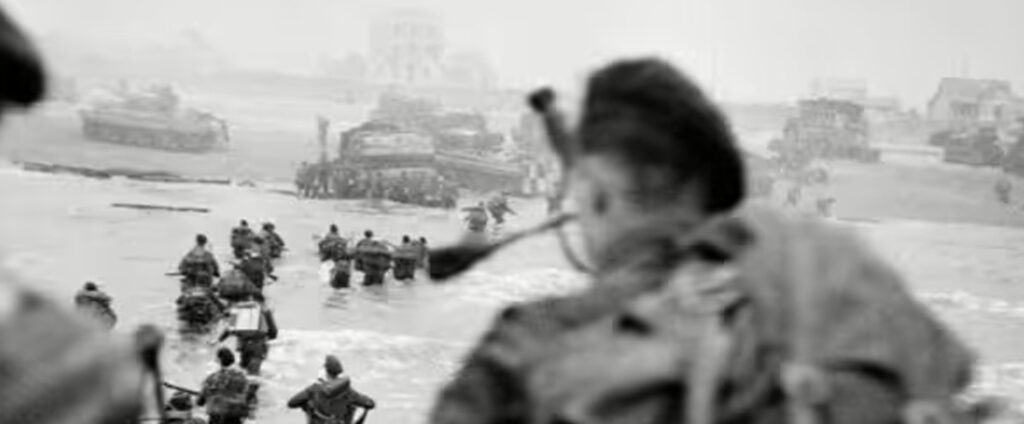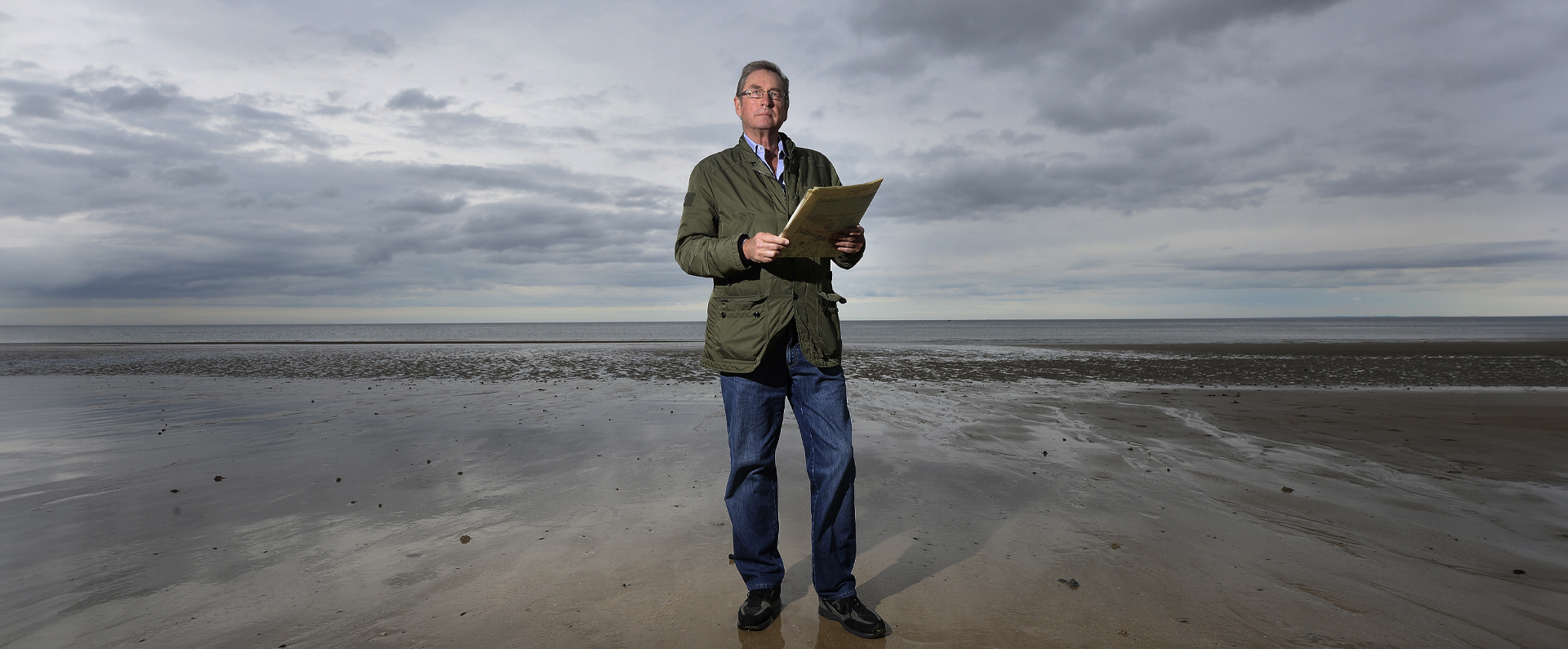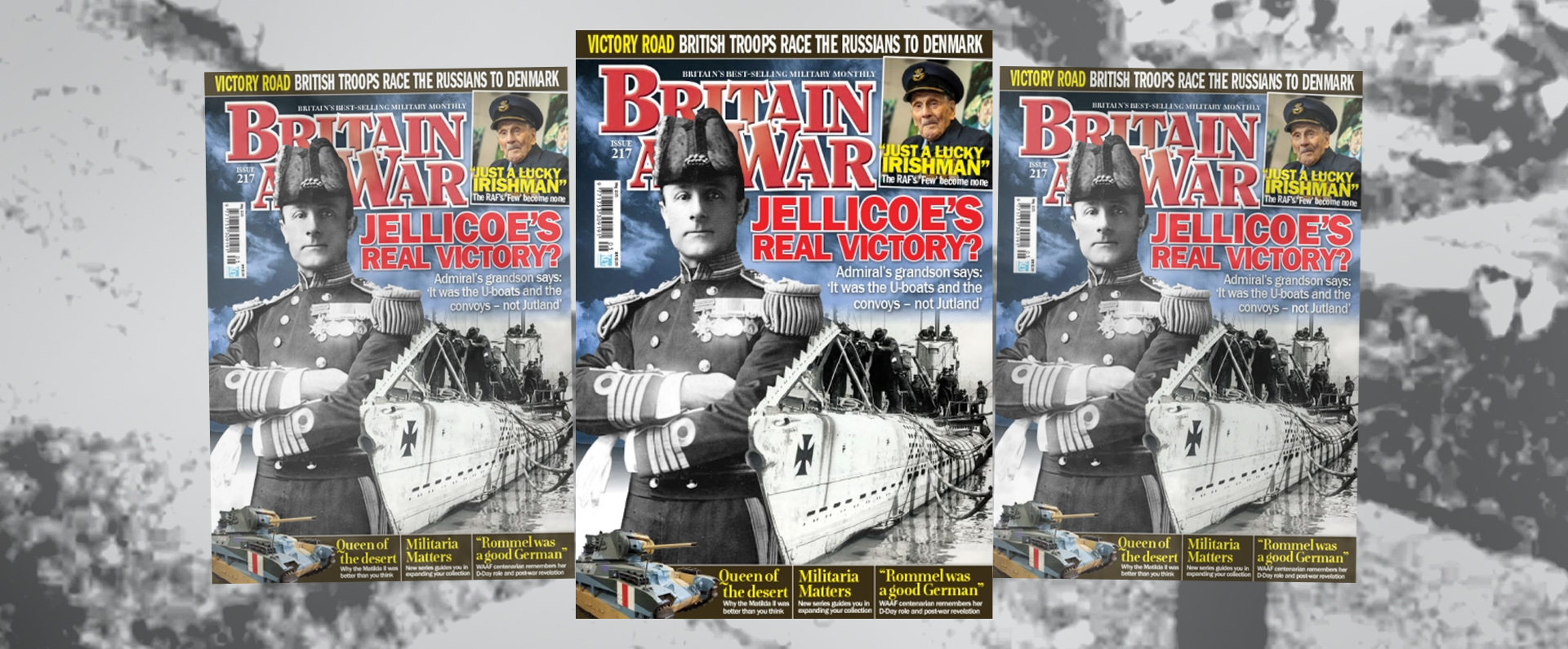
Published in the Daily Express on 05 June 2024.
Despite the success of D-Day, we must never forget its horrors or the sacrifices made by those who were killed or wounded. Eyewitness accounts leave us in no doubt about quite how brutal June 6, 1944 was for so many.
Marine Edward “Tommy” Treacher, of 45 Commando, was one of those to provide a vivid description of just how dangerous it was arriving on one of the five Normandy beaches chosen for the invasion – and how quickly things could go wrong.
“We was [sic] 400 yards from shore and there was a crash on our boat and a shell had landed amongst all the chaps waiting to get off. They were lying there, they were wounded, they were dead, as a matter of fact we had 23 casualties on our boat, 11 dead and 12 wounded.
“As we were getting closer, the matelots [seamen] were ready to push the ramps down and there was blood everywhere – there’s no doubt about it, it was thick – and when the navy blokes was [sic] going to push the ramps down another shell hit us and it killed all four. As a matter of fact, they were decapitated.”
Treacher described how an officer and three sergeants took the place of the four dead men and pushed down the ramps, which were badly twisted from the explosion moments earlier.
“God, it was a state. We had to walk through this blood on the deck and it was really running, it was terrible and as I was going to get off the boat, I spoke to one of my friends, and I said, ‘How are you, Jasper?’ And he says, ‘How am I, Tom? How am I? I reckon I have broken both my legs’.”
Private Lionel Roebuck, of the 2nd Battalion, East Yorkshire Regiment, also described horrific scenes: “Each side of us there were wrecked boats, sometimes side on, sometimes upside down. There were bodies facing face down in the sea. There were men half way up the beach who were in really peculiar positions, legs all over the place, really grotesque positions, and there were shells landing all around us in the sea and on the beach.”
As thousands of men ran up the beaches, the dangers were equally grave. Private William Lloyd, also from the 2nd Battalion, East Yorkshire Regiment, said: “Bullets just came at you like raindrops. You could hear them whistling and passing you and hitting the ground near you but you kept going on.”
A lack of leadership was an issue too, particularly for those regiments that had lost their senior officers in battle. This, in turn, led to chaotic scenes on the beaches.
Sergeant Arthur Thompson, also from the same East Yorkshire Regiment battalion, said: “We lost our company commander and quite a number of officers on the beach. The company commander called an O group to arrange what we were going to do and they got killed. They’d formed a circle or something and I think a shell or mortar dropped in amongst them all.
“After that we’d only some young lieutenants and we’d got to take hold of their hands and take them on with us because they had no idea, you see. It was one of the times where you’ve got to have someone who can just do things without getting excited or flustered.”
Another of the estimated 155,000 Allied servicemen who took part in the D-Day landings was my father, Eric Ashcroft, then a young lieutenant himself with the 1st Battalion, South Lancashire Regiment.
As my father, the battalion’s signals officer, raced up Sword Beach into this murderous enemy fire, he was wounded: “About two-thirds to the high water mark I was knocked sideways when, so it would appear now, an 88-milimetre splinter struck my right arm. I was moving across the beach at the time fairly fast and I didn’t think anything about it. I just kept moving,” he later recalled.
Typically, my father displayed a wonderful eye for detail: “I remember, when we were [sheltering from enemy fire] in the sand dunes, I was looking down and saw a procession of ants and thought ‘Goodness me, they’re not affected by the war.’ These silly thoughts you get.”
However, it was at this point that my father’s commanding officer was shot dead at his side. “Colonel [Richard] Burbury was about two feet away from me and the next thing I knew he rolled to his side and was shot in the chest,” my father said. His CO, aged 38, had been killed by a sniper’s bullet.
One of my father’s many qualities was modesty: he failed to highlight in his interview that he kept on fighting for a long time after being wounded. It was only when he was ordered off the battlefield that he had his injuries treated.
Because my father was one of the wounded, he was able to describe how the Allied injured on June 6, 1944 were looked after. “I was sent back to the field dressing station and it was at that stage that I saw many of the wounded on the beach area. I saw officers that had been blinded, walking wounded, stretcher cases, and all the documentation was going on.
“Labels, tags. Ones they were giving morphine had lipstick put on their foreheads, I seem to remember: a capital M. The documentation went on meticulously by the Royal Army Medical Corps.
“Towards nightfall we were collected by a Royal Army Service Corps DUKW [amphibious] vehicle, incredible vehicles which go on land and swim on water. Just about dusk we entered a fairly rough sea, we inflated our life jackets and we swam – that’s the word used for the propelling of these vehicles – out to a Landing Ship Tank [LST] and this ship lowered its ramp and we went inside into brilliant light.
“The whole area was like entering a great hall. Around the sides were bunks and towards the end were green tents with lights in. They were the mobile operating theatres. And you could still smell the oil from the tanks: during the day the tanks had been carried across and the tank crews and the tanks had come out and the LST then became a mobile hospital.”
Once again, my father’s excellent memory served him well: “There must have been about 300 people on this LST and the ones that were able were given a higher bunk and the ones that found it difficult were given a lower bunk. It was a hospital ship, really, and they were able to carry out quite sophisticated treatments right from [leaving] the beaches.”
In fact, the number of wounded was far less that the Allied command had feared. My father once told me that he and his ill-fated CO, Colonel Burbury, had been briefed to expect 75 per cent casualties – dead and wounded – in the early landings on the Normandy beaches.
In fact, just over 4,400 Allied troops were killed on D-Day alone and just over 5,000 were wounded.
It was only a decade ago, several years after my father’s death, that I discovered he had been tape recorded giving his recollections of D-Day to a wider audience for the Imperial War Museum. I learnt of this because I looked into various aspects of my father’s war-time record before visiting Sword Beach for the first time to see exactly where he had landed. This visit took place just days before the 70th anniversary of D-Day.
As I listened to the recorded interview of his for the first time, tears started to roll down my cheeks. It brought home to me how small the margin can be between life and death. If the sniper’s bullet that killed Colonel Burbury had been just two feet to one side, my father’s life would have been over, aged just 27, and I would never have been born.
My father’s unique recollections of D-Day, along with the descriptions provided by other eye-witnesses, give us a valuable record of events that day.
In fact, my father was one of the lucky ones: he recovered fully from his D-Day injuries and went on to enjoy a satisfying career as a colonial officer. He eventually died in February 2002, a month before his 85th birthday.
My dear father is the person most responsible for my life-long interest in bravery that has seen me build up the world’s largest collection of Victoria Crosses. I currently own more than 200 of the decorations that were all awarded for outstanding courage in the presence of the enemy. My passion for valour has also seen me write seven books in the “Heroes” series and lecture widely on gallantry, including my own medal collections.
Of course, I have no monopoly on being proud of a close relative’s part in the D-Day landings. Today there are thousands of people up and down the country whose fathers, grandfathers, uncles, brothers and cousins also played courageous roles in the fight against Nazi Germany.
Sadly, very few of those who took part in D-Day – no more than a handful – will be able to travel to France this month to commemorate the largest single naval, air and land operation in history.
Most of the war veterans are, of course, long dead as they would pretty much have to be 100 years old or more to have participated in the landings.
However, the 80th anniversary of D-Day is an entirely appropriate date to remember those who lost their lives or who were wounded while playing a key part in changing the course of the Second World War.
The success of the Allied servicemen on D-Day marked the beginning of the end for Nazi Germany. Tomorrow on June 6, we will remember their commitment, their bravery and their sacrifice.
Read this article on Express.co.uk
DOWNLOAD PDF

